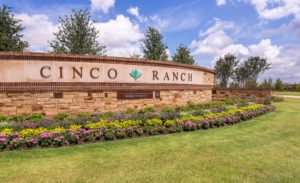City governments have their pros and cons, and their challenges getting things done. But at least their existence means residents of said cities have places to go when they need various services. Not everyone has that, and in times of crisis like what Harvey has wrought, that’s a big deal.
Cinco Ranch, a master-planned community 25 miles west of downtown Houston, is governed by a patchwork of municipal utility districts – MUDs for short – obscure entities that sell bonds and collect taxes to pay for water systems, sewage plants, roads and other infrastructure.
The closest thing to a mayor for Cinco Ranch is G. Timothy Lawrence, 74. He’s a semi-retired businessman and president of the board of the community’s main MUD. He and his four fellow board members set the property tax rate and hire lawyers, engineers and financial advisers. Yet he has never lived in Cinco Ranch and did not set foot there during the flooding. His home is a 20-mile drive away, in the Royal Oaks section of Houston.
Drawdy and many of his neighbors had never heard of him.
MUDs have proliferated in the Houston suburbs, helping to power the region’s runaway growth, because they offer developers an advantageous way to fund infrastructure. In unincorporated stretches of suburbia, they have evolved into permanent mini-governments largely invisible to the taxpayers they serve.
The devastation wrought by Harvey has stirred fresh questions about whether MUDs and similar special purpose districts are sufficiently transparent and accountable, and whether they’re capable of putting the public interest ahead of developers’ interests – particularly in protecting neighborhoods from flooding.
Typically, MUDs are created at the initiative of developers, who pick their initial board members, lawyers and other professional advisers. The districts sell bonds to reimburse developers for infrastructure costs. Residents pay off the debt through property taxes.
MUDs usually do not have websites, nor any physical presence in their communities. In Cinco Ranch, which is divided into 16 separate MUDs, there is no city hall and no civil servants. Water and sewage facilities are operated by contractors hired by the main MUD. That MUD’s board members usually hold their monthly meetings not in Cinco Ranch, but in the offices of the district’s law firm near downtown Houston.
“It’s the difference between paying your monthly bills to a nameless organization with an acronym and a number versus someone you know, who could be held responsible for what happens in a crisis,” said Brandon Rottinghaus, a political science professor at the University of Houston.
You know how I feel about MUDs. It should be abundantly clear that MUDs are no substitute for government, which will mean different things to different people. Is this a good deal for the people of Cinco Ranch, who are dealing with the effects of Harvey without having any of the services and information dissemination capability that people who live in Houston expect? Is it the sort of thing that would make them reconsider their situation, and maybe work towards incorporating? I suppose if there’s no urge to think about those things now, there never will be. I wish the residents of Cinco Ranch and other such developments the best in getting the assistance they need, and in assessing their options going forward.

